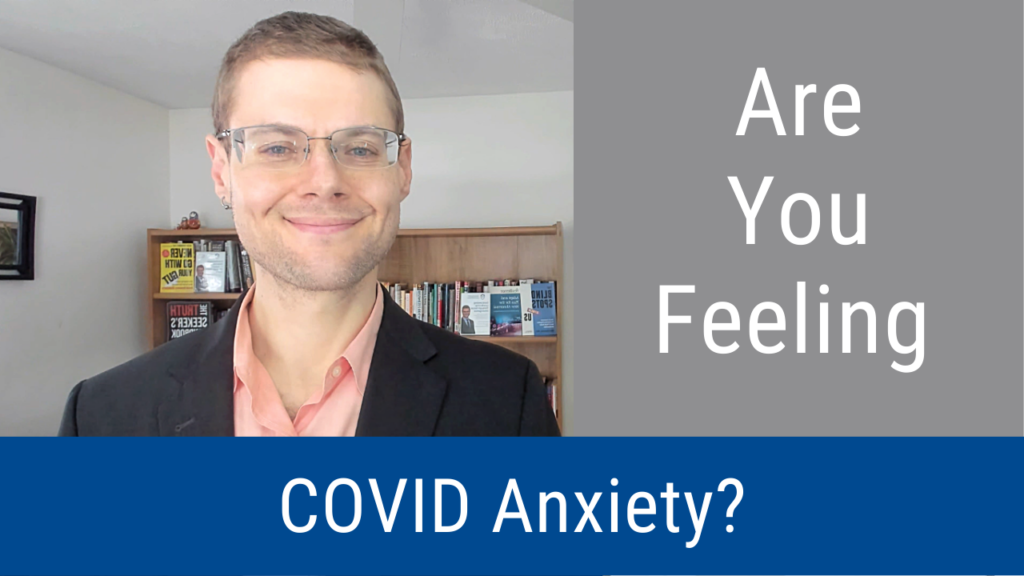
Deal with COVID anxiety and stress immediately by addressing your fundamental needs of safety, connection to others, and self-esteem. That’s the key take-away message of this episode of the Wise Decision Maker Show, which describes what to do if you are feeling COVID anxiety.
Video: “Are You Feeling COVID Anxiety?”
Podcast: “Are You Feeling COVID Anxiety?”
Links Mentioned in Videocast and Podcast
- Here’s the article: Are You Feeling COVID Anxiety?
- The book Resilience: Adapt and Plan for the New Abnormal of the COVID-19 Coronavirus Pandemic is available here
- You are welcome to register for the free Wise Decision Maker Course
Transcript
Hello, everyone, and welcome to another episode of the Wise Decision Maker Show where we help you make the wisest and most profitable decisions. I’d like to talk today, about COVID anxiety. A lot of folks are feeling it, the pandemic has been so stressful. And believe me, I’m feeling it as well. The wonderful news is that we have vaccines coming up very highly effective, that’s great. But it’ll take a while for them to get here. And in the meantime, we’re really in the worst stage of the pandemic, in terms of case counts, there’s never been more cases in the US and around the world of the pandemic, it is really bad right now. And this is a perfectly understandable time for us to be feeling anxiety around COVID. And you want to address that anxiety effectively. You don’t want to wait for it, it won’t just magically disappear if you wait for it and hope it will disappear. And I know that myself, I’m someone who suffers from an anxiety disorder and anxiety adjustment disorder. It’s something well, I suffered from it more in the past and something I had treated. And I let it get so bad because I didn’t realize I should go and actually get it treated by a professional or do other interventions. You know, there are certainly some things that if things get bad enough, you should definitely go and get professional help. And I did so I got both a therapist and a psychiatrist and got psychiatric medications that was very helpful. But if I caught it earlier, before it got so bad that I got into a diagnosable condition, I could have done a number of things to address it earlier. And you can do these things. If you feel anxiety developing before you need to go to a specialist. And of course, if it’s bad enough, you’d definitely want to get the help of a specialist. But just like the pandemic, anxiety won’t disappear. So you make sure to take care of it. Don’t fall into the normalcy bias. The normalcy bias causes us to believe that hey, the future will be much like today, you know, everything will go back to normal will be fine. Not the case, even once the pandemic is gone, the anxiety around it will still be there even once you get a vaccine. And I really hope you’re planning to get a vaccine. Even once you get a vaccine, it will still take a long time to adjust to the new conditions and our behaviors or thoughts or feelings or patterns of engaging with others will never go back to January 2020. Just because of the experience of the pandemic. See, can’t think that all will go back to normal, everything will be fine. Now just be crossing my fingers waiting until that time and just tolerating this anxiety, don’t do it. You want to take active steps right now to address the anxiety that you might well be experiencing? And of course, if you notice anxiety, how do you notice that you’re experiencing anxiety? Well, there are different ways of coming out for different people. For me, for example, anxiety comes out in a feeling of fatigue, in the feeling of agitation in a feeling of just desire to move quickly and accomplish things quickly. And restlessness, chest tightness. And heavier when the anxiety is heavier, it’s expressed in fatigue, but it might be different from you. For you. It’s just whatever your responses to a perceived external threat. Whatever those responses are when there is no external threat. I know that when I face a real external threat, I get agitated. And because of my response, there’s the flight response. And there’s the five responses, my response is the fire response. The flight response, that’s the fatigue, for me, is what I get when I can’t address a threat once that big or somehow I can’t actually take action to address it. You want to learn how you respond to threats, how your body responds to threats. And then see, do you have that threat response? When you hear things about the pandemic when you learn what’s going on? news about the pandemic, maybe like your relatives about your friends are generally in the news? And then do you have that? Do you have that in xiety response and that will tell you that you’re likely suffering from some COVID anxiety and you want to take steps to address it. So you want to think about addressing your basic needs as a first preliminary activity. Uncertainty is very stressful and we don’t know what’s going to happen with the pandemic in the future. So you want to create a sense of stability for yourself over things that you can control. There is a concept called locus of control. So people who feel that the world is outside of their control, it’s called having an external locus of control. And they are just resigned to their fate. They feel that, well, the world just buffs them around and they go with the winds, whatever they go. That’s not a great perspective on the world, a much more effective perspective is an internal locus of control, where you focus on the things you can control. And there are only three things that any of us can control: our thoughts, our feelings, and our behaviors. That’s all we can control in life, our thoughts, our feelings, and our behaviors. So those are the things you really want to focus on those, that’s what you want to focus on and have your internal locus of control over those. And through that, you can control your environment, your external environment, you want, especially address for the sake of COVID, anxiety, your sense of safety, your sense of connection to others, and your sense of self esteem. So those three areas will really help you address COVID anxiety, and those are your basic fundamental needs. So if you’ve heard of Abraham Maslow’s hierarchy of needs, that’s what they refer to those basic needs, those fundamental needs, that we really need to address to make sure that we don’t feel that threat to our world. So address those three needs safety, connection to others and self esteem, safety, what’s that? So safety, you want to address basic safety, a basic sense of safety for yourself. As we go with this situation, with COVID getting worse and worse. And the winter, it’s really bad cooped up inside, people aren’t taking as many precautions as they should be. So we’re having more and more cases, that’s a big problem. And we’re having more and more restrictions, of course, as a result, and in case there’s an outbreak in your area that’s especially big, you’ll have like a number of areas, have municipalities and even whole states have stay at home orders and closing down on non essential businesses and really, kind of drastically not saying it’s bad. But you have to understand not saying it’s a bad policy choice by the government can debate that that’s a separate question. But it will happen in a number of areas. I know it’s happening in some areas, and will happen and others. So you want to be prepared for these waves of restrictions. And that means having a couple of months worth of basic supplies. Because people are buying out groceries, people are buying our basic supplies, I don’t recommend that you go to the store and empty your grocery shelves, you can go to websites that sell things in bulk, and those will be cheaper for you easier to deal with. For example, not statcom does not sell in bulk. And beans have come whatever, just Google beans in bulk, or not some bulk or toilet paper in bulk, or whatever you want to purchase. And that will help you that’ll save you some money. And that will make sure that you don’t empty the grocery shelves for other folks. non-perishable food is once you want to get that’s why I mentioned beans and sell on consumables or paper cleaner, and so on medication of various sorts, whatever medication you’re using, given online pharmacy, those can be helpful and don’t have to have any interactions with people. So that’s what you want to be thinking about in terms of safety. Next connection to others. How do you connect to others in this really bad situation with a pandemic, especially if you can do indoor stuff normally, that’s difficult. So what you want to do is make sure that you still maintain relationships with others who care about friends and family and your broader community, and figure out ways to do that. Members of your household figure out how to maintain your relationships with them without going stir crazy. As you’re both cooped up in this cold weather in the winter. It’s pretty bad. And these restrictions you want to figure out how you are going to connect with them and engage with them in a healthy manner when you’re interacting with them? 24 seven, your romantic partner, they might be a member of your household they might not be. So you want to figure out how are you going to stay engaged and connected with them again, this 24 seven environment, it’s a pretty if they’re a member of your household, it’s pretty difficult when you’re used to interacting with them, you know, maybe for an hour to a day, which is for working folks. That’s what the typical interactions were like before the pandemic and right now if you’re both working at home with so many people, that’s a 24 seven environment. Loved ones in high risk groups. So senior adults, for example, if you’re taking care of your elders or if you have parents if you’re lucky enough to have people Parents who are still alive, or other folks like that, and some calls, how are you going to engage with them, especially if they need elder care, especially if they need care and support. So you want to think through and make a plan for engaging with them in these few months remaining of the pandemic, hopefully very few months with the vaccines on the way your friends, you want to make sure to stay connected to them. That’s an important source of meaning and purpose for you for film, unseal, stay connected with them virtual interactions, maybe some outdoor hikes right now in this cold, chilly weather, and community and faith groups. So that we definitely don’t want to do in person indoor interactions. But you can certainly do virtual interactions. And there are certainly some outdoor activities you can do even in cold weather. self esteem is the last area. And this is something that folks don’t think about nearly well enough, they might think more about safety and connection to others. But self esteem has been shown to be really important for basic as a basic fundamental need for us to really feel in control of our life. And in our environment. To have that sense of mastery, you want to have that self respect. So make sure you’re doing whatever gives you a sense of self respect. And it can be difficult in the pandemic, because the previous things that might have given you a sense of self respect, might be unavailable if they depend on indoor activities and connection to others in ways you know, indoor hanging out with people having that self respect, maybe some hobbies, maybe those community and faith groups. So you want to make sure to replace that maybe some volunteer service, self confidence, which gives you a sense of self confidence. Again, it’s going to be harder in the pandemic because of the deprivation. So you want to make sure to replace that figure out how else you can get self respect and self confidence in virtual ways in ways that are not dependent on risk activities, sense of mastery over your own fate, whether it be about your work, and making sure to have a career that will be pandemic aligned, you know, maybe more virtual work, changing, shifting your career, maybe developing hobbies, developing activities that help you stay in control. So for example, I’m doing much more indoor gardening right now. So I’m growing some herbs, doing indoor house keeping householding, which I previously hired folks for are handymen and women to repair things. So that gives you a real actual sense of control and mastery that you want to be thinking about these sorts of things, and making plans to achieve these things. So don’t simply think I’ll do this, but make a specific plan for how you will achieve self respect, self confidence. And that sense of mastery. Learning new skills is a great way of doing so. So you talked about indoor gardening for me, and household activities, whatever skills that you might want to learn you’ve been putting off on the backburner, this might be a good time to do so. Especially skills that help you have that sense of control over your immediate environment. So those are the things that you want to be thinking about as you’re moving forward and addressing COVID anxiety, focus on those addressing those basic needs. So again, safety connection to others, and self esteem is what you want to address to make sure to get away from that COVID anxiety, which is really harmful, dangerous, and not productive. You want to make sure to take care of it. And if it gets especially bad Of course, go have a virtual appointment with a therapist, have a virtual appointment with your primary care doctor for some medication, have some virtual appointment with your therapist for a full four with a therapist for therapeutic help. So that’s definitely something to do if you can’t take care of it on your own or if it’s bad enough that it seriously interferes with your daily life. All right, I hope this has been helpful for you for learning how to address COVID anxiety. As always, for I hope that you’ve enjoyed this episode of the wise decision maker show. So please make sure to click like on the show if you’ve liked it on your favorite venue. We have both a video cast and a podcast. And both will be linked in the show notes. So if you’re listening to this on a podcast, you can check out the video cast. You’re listening to us on the video cast. If you’re watching this on the videocast check out the podcast and follow us of course on your favorite venue whether it’s iTunes, Amazon, YouTube, spreaker, or wherever you’re listening to us. Please follow us. Leave a comment and leave a review. I love to hear your comments. I’d love to hear your views. They really helped me learn how to serve your needs better and how to provide better content for you. Please Of course, share it on social media. If you found it helpful, send it to a friend. Make sure that they learn how to address COVID anxiety. Now there will be a couple of books that I want to recommend for you to read one is a basic book on how to address threats, manage risks, make good decisions, whether about anxiety or anything else. It’s called never go with your gut how pioneering leaders make the best decisions and avoid business disasters. And another one specifically relevant to COVID will be resilience, adaptation and plan to the new normal of the COVID-19 Coronavirus pandemic. The first one never goes there. You’ll find that disaster avoidance experts comm forward slash never got it’s going to be linked in the show notes and the other one on adapt and plan to the covid 19 coronavirus pandemic and the post pandemic recovery will be a disaster avoidance experts.com forward slash adapt that will be linked in the show notes. For a great free resource on making the wisest decisions possible. It’s the fundamentals of the Wise Decision Maker Show. It’s called the Wise Decision Maker Course. It’s an eight video based module course on making the wisest decisions. So check that out at disaster avoidance experts.com forward slash subscribe, and that will be in the show notes. All right. I hope you found this episode of the wise decision maker show helpful. And as always, I’m wishing you the wisest and most profitable decisions, my friends
Transcribed by https://otter.ai
Originally Published at Disaster Avoidance Experts on January 12, 2021




